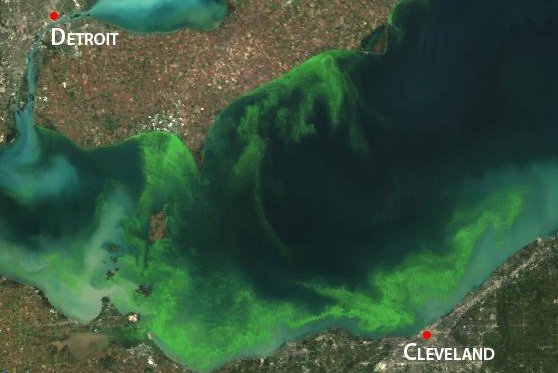Algae bloom in Lake Erie, as seen from space. (NASA/NOAA)
COLUMBUS, Ohio, Aug. 5 (UPI) -- Only days after a toxic algae bloom in Lake Erie left some 400,000 residents of Northwest Ohio without safe tap water, policy makers and regulators are looking for ways to prevent a similar crisis in the future.
Because the growing algae that blooms in the Great Lakes and elsewhere have been blamed on spikes of phosphorous -- carried along with the runoff from industrial farms -- fertilizers have become the hot topic for environmentalists and regulators.
Ohio's legislature already passed a law that requires farmers to take a one-day class before receiving their new commercial fertilizing license. Proponents of the law say it will teach farmers how do more with less and empower regulators to revoke licensing if problems are found around a farm using an excess of nutrient rich fertilizer.
But many environmentalist say that the new licensing law -- which doesn't go into effect until 2017 -- is a small solution for a big problem.
"This isn't a matter of farmers fine-tuning what they're doing," Howard Learner, president of the Environmental Law & Policy Center, told the Wall Street Journal. "This requires a substantial rethinking of how nitrogen and phosphorus is used in the agriculture sector."
Learner's groups and other advocacy organizations have ramped up pressure on the EPA to regulate allowable nutrient levels in major bodies of water. There's yet to be movement on that front, but environmentalists think a crisis like Toledo's could push both local and federal authorities to take action.
Lawmakers in Ohio are currently on summer vacation, but committee meetings are schedule to discuss the crisis and ways to prevent another when politicians return to Columbus.
"This emergency situation demands emergency action," Jack Shaner of the Ohio Environmental Council told the Toledo Blade. "We see the House of Representatives have September dates scheduled 'if needed.' If this isn't the definition of 'if needed,' I don't know what is."















